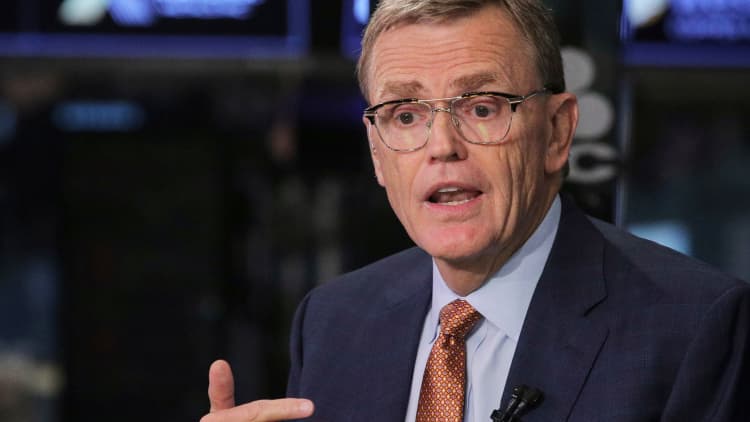
UPS Chairman and CEO David Abney told CNBC on Thursday that he's not concerned about Amazon's status as both a friend and foe of the logistics giant.
"We watch what they do," Abney said on "Squawk on the Street." "They're certainly a customer, but they can be a competitor in certain areas, and we monitor that."
Big-time logistics companies such as UPS are in a precarious situation with Amazon as the e-commerce giant builds out its own delivery business.
Amazon represents about 12% of UPS' revenues, according to CNBC's Frank Holland, and Abney noted the two companies' relationship grew, on a percentage basis, in the last year.
Abney attributed the growth to three things: competitive winds, structural change that Amazon and others instigated around next-day delivery, and a muted international supply chain due to macro challenges such as trade tensions.
"We've got a mutually beneficial relationship," Abney said, suggesting the current relationship between the companies wouldn't be disrupted "as long as it stays mutually beneficial."
Shares of UPS were down more than 5% on Thursday after the Atlanta-based company reported earnings.
UPS saw quarterly revenue growth of 3.6%, but it was still slightly below Wall Street estimates. UPS also issued a full-year earnings-per-share forecast below expectations.
One day earlier, UPS announced it placed an order for 10,000 electric vehicles from U.K.-based start-up Arrival, a move that came months after Amazon announced it planned to buy 100,000 electric vehicles from Rivian.
UPS and Amazon also are both taking part in a New York City pilot program designed to reduce road congestion by making deliveries on cargo bikes. DHL is the third company in the pilot.
Amazon delivers about half of its own packages in the U.S., according to a Morgan Stanley estimate. The investment bank also estimated Amazon will soon pass both UPS and FedEx in total volume.
FedEx has taken a significantly different approach from that of UPS, announcing in August that it would not renew its ground-delivery contract with Amazon.
The change is part of the company's efforts to "focus on the broader e-commerce market," a FedEx spokesperson told CNBC at the time.
The rivalry between the companies heated up around the holidays, when Amazon temporarily prohibited third-party sellers from using FedEx's ground-delivery shipping.
Amazon began allowing the third-party sellers to use the service again on Jan. 14, sending shares of FedEx almost 2% higher on the announcement.
Shares of FedEx are down about 18% over the last year. UPS' stock is up about 8% over the same period.


